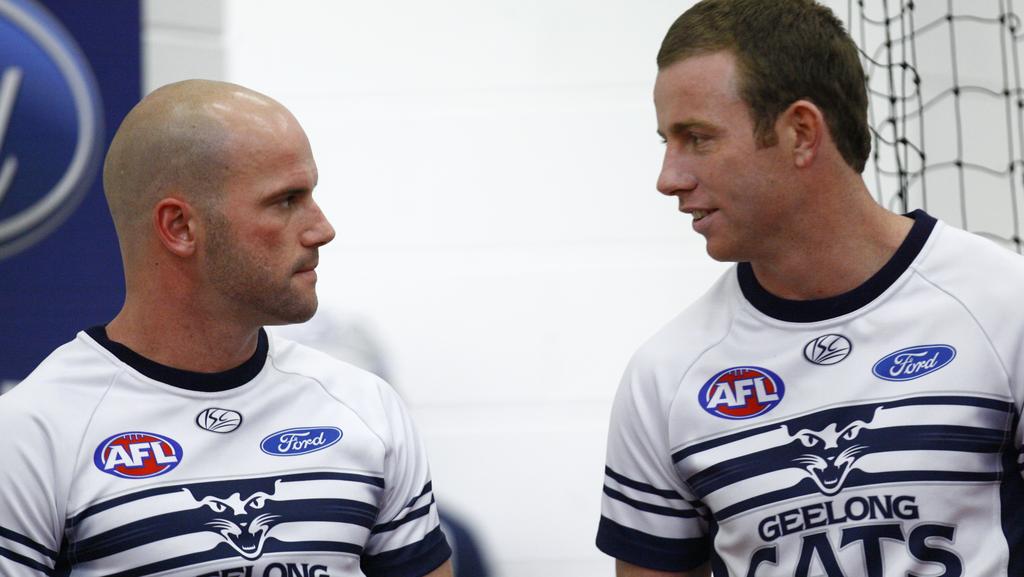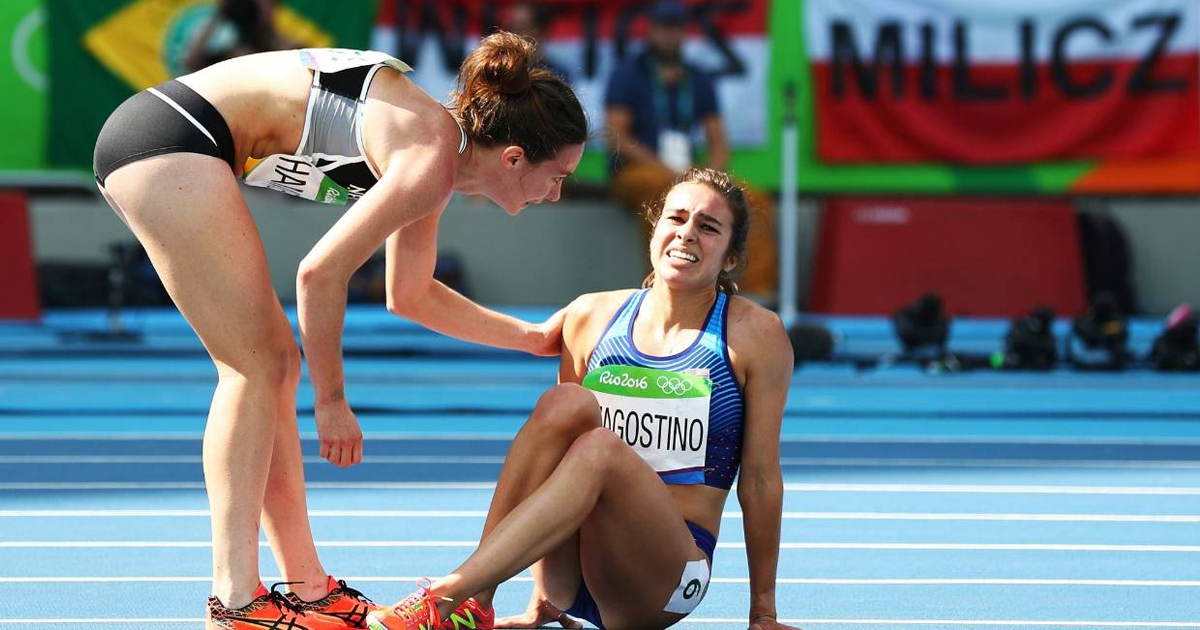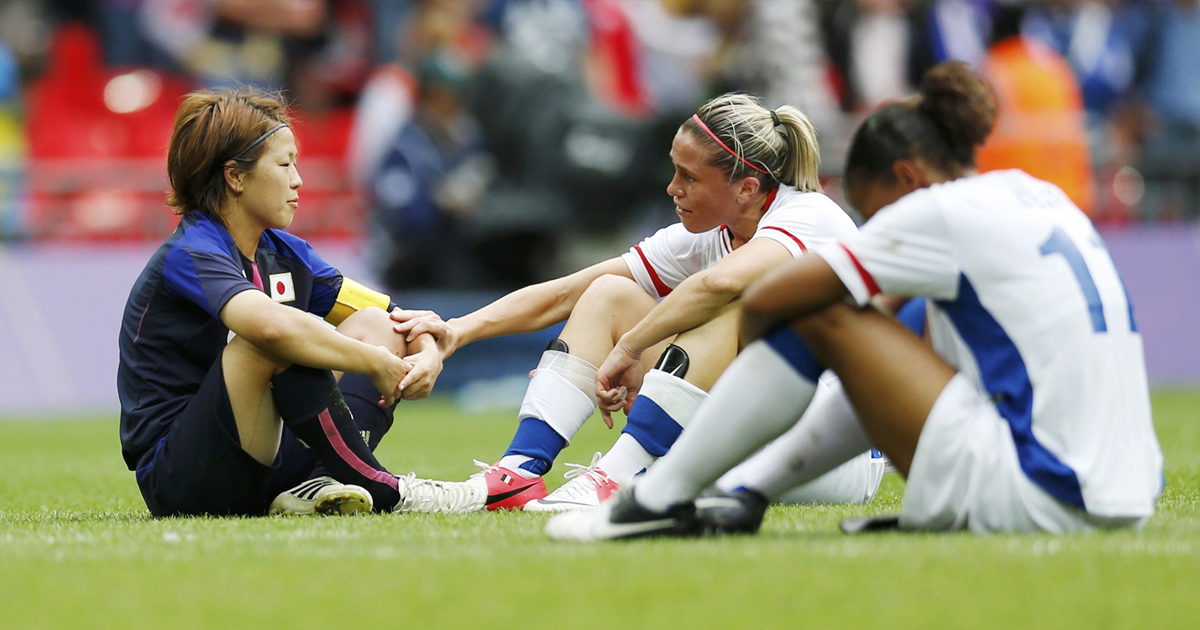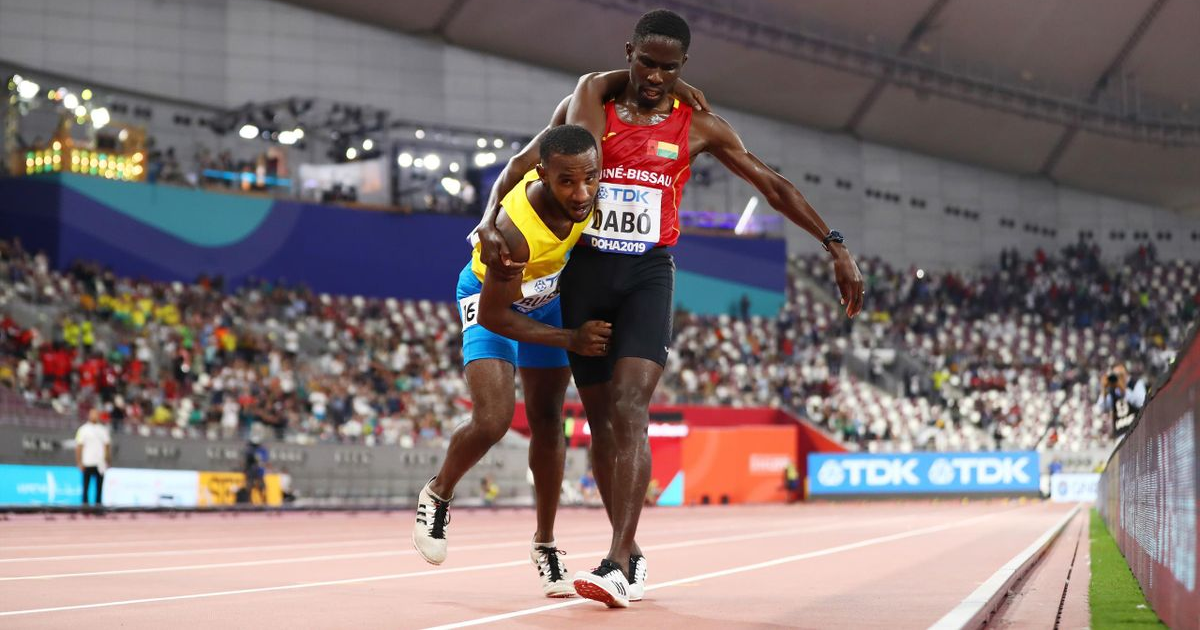Respect Trumps Harmony: Lessons for Sport

Once in a while a book comes along that is built on a premise that is so simple but so practical that you are grateful to the author. Melbourne author Rachael Robertson’s book ‘Respect trumps Harmony’ was a revelation for me.
Rachael has had an amazing range of life experience including leading the 58th Australian National Antarctic Research Expedition to Davis Station, Australia’s largest in Antarctica, working on the Emergency team for the Black Saturday bushfire horrors and becoming one of Victoria’s youngest Chief Rangers.
Most Saturdays in winter she can be found standing in the cold watching a grassroots Australian rules football game and I was very keen to pick her brains about the applicability of her philosophy to increasing interpersonal respect in sport.
Respect Trumps Harmony
Patrick: Tell us about the central premise of the book and how you had the light bulb moment.
Rachael: The central premise is that respect trumps harmony and I truly believe this. It came to me when I lived in Antarctica and was managing such a diverse team, really different people, not just on age and occupation but sexuality and gender and stage of life.
And at the ‘get to know you’ barbecue I thought ‘wow these are really different people’ and I don’t want to force this mateship, harmony and ‘we’re all in this together’ culture.
So I took it off the table and said you don’t have to be mates, you don’t have to love each other, you don’t even have to like each other but you do have to treat each other with respect and that became our mantra for the whole expedition. We worked really well in a crisis because we had this bedrock of respect.

From Antarctica to the sporting fields
Patrick: In your bestselling first book – ‘Leading on the Edge’ you documented your year in the wilds of Antarctica. From your account, it was a cold, dark, harsh, dry, treeless hell. In this dangerous place, your team of 18 were getting homesick with minimal contact with the outside world. Adding to that you were faced with the mental and physical challenges of cabin fever from living in cramped close quarters.
It’s like an extreme version of team sport where you have groups of between 5-30 individuals often randomly assembled with the challenge of turning them into a high-performance team.
Rachael: It does relate to sport, especially sports that have specialist positions, either offence or defence with different skills that come together and form a team and contribute.
In sport, it’s the sum of all these specialist parts working together. Traditionally there has been a culture of mateship in Australia and I’m not saying that’s wrong but as your teams get more and more diverse that’s a lot of pressure on people to get along.
Putting on a front that says: “We’re a big happy family and side by side we stick together” and all of that pressure to get along hides and creates a reluctance to confront mental health issues at an individual level and confront real problems at an organisational level.
The key is accepting that you don’t have to like that person but you do have to respect their contribution because without that person we won’t be able to achieve what we are trying to achieve.
Abuse of Match Officials
Patrick: Across a number of sports there is a problem with abuse. Fans, players, parents, coaches disrespecting match officials and each other. Match officials bring a very important skill set and neutrality, yet the abuse seems to be getting worse. Have you had any experience with this phenomena?
Rachael: Sadly I have had a recent personal experience watching a local Aussie rules game. A parent of one of my son’s teammates assaulted our coach and was expelled from the club for life. I’m embarrassed that it was my club but I’m proud the club came down strongly because you need zero tolerance on volunteer safety. I also feel for the children because they can’t ever play again for the club.
We have appointed match day officials who wear red clothing and walk around the boundary line to step in if people are behaving in an inappropriate way and take the heat out of the situation. It helps so it’s not the other parents who have to ask the person to stop swearing.
Patrick: If behaviour like abusing match officials becomes normalised and part of the culture, is it a much more difficult thing to remove later?
Rachael: Definitely because then it becomes generational and ingrained as kids are listening to their parents and think it’s ok to do that. And that’s where it needs to stop, we need to model good behaviour for the children like accepting referees and umpire decisions.
The Negatives of Harmony
Patrick: In the book, you outline the negatives of harmony – that in order to keep the peace the default setting is to turn a blind eye to negative behaviour, which if left unattended will often escalate. What are the consequences when disrespectful, unsafe and dysfunctional behaviour is not addressed?
Rachael: That behaviour still goes on but it just goes underground. If you have bullying or harassment or racism or misogyny, all of those bad behaviours go on but people don’t report them and the leaders don’t know what’s going on. And even when they know, sometimes they don’t want to rock the boat because the focus is on harmony and keeping the peace.
The alternative is to create a culture where if someone’s upset about something they speak up, deal with it and move on rather than letting it fester.
Disrespect learnt at sport bleeds into other areas
Patrick: When kids see their parents abusing match officials I can’t help but feel it bleeds into disrespect of other authority figures like firemen, policemen and teachers. You sign up your kids to sport for the positives not to pick up terrible behaviours.
Rachael: Absolutely. Sport is so important in Australian culture and we can’t have kids witnessing bad behaviour and carrying it into other parts of their lives. Coming in and out of lockdowns we need our kids out playing sports, we need them feeling a sense of community, feeling healthy, all those benefits from playing sport.
By all means be passionate, yell and be emotional and it’s a great release from pressure to go and watch sport on the weekend but we draw the line at personal abuse and personal jibes because kids can’t understand the difference and it bleeds out into the community.
Patrick: Another Australian cultural pillar is the concept of ‘white line fever’ as an excuse for abnormal behaviour.
Rachael: I think it’s not good to excuse white line fever behaviours by saying that once you cross the line its ok to behave in an antisocial way. It’s not ok.
Respect critical for harnessing diversity
Patrick: How important is the practice of respect with the increasing diversity of player/fan bases?
Rachael: As society gets more diverse so do the sporting teams. One day you’ll be playing on a team with someone or against someone or be officiated by someone you’ve got nothing in common with, and that’s ok. You don’t have to be their best friend off the field and on the field, you just have to respect their contribution and respect they have a right to be there.
Choose your own culture
Patrick: I love the big question you pose in the book and its applicability for teams, sports, competitions:
Do you want a culture of harmony to prevail over a culture of integrity and respect?
Rachael: I think success is tied to respect and I’m a Geelong supporter and I look back to the 2007 & 2009-11 era when they won the premierships and I’m not speaking out of school to say there were two players – Paul Chapman and Stevie Johnson that didn’t get along and didn’t have a lot in common.
Yet they were a hugely successful team and part of the secret to that success was the ability to say I might not like you as a bloke, we might not socialize together and be best mates but once we come together as a team I appreciate your contribution and I respect your skill and ability and together all of us are greater than the sum of all parts. Even success will come from that bedrock of respect and integrity.

Respect is an input, Harmony is an output
Patrick: One concept that resonated with me was: “Respect is an input and harmony is an output.” That harmony is an end state that comes from respecting differences because what people find disrespectful or offensive differs according to our own values and life experiences.
Rachael: We are talking fundamental human respect for another person like an umpire, to respect their right to be on the pitch, respect their right to contribute, and treat them with humanity and respect.
It’s a subtle difference and the whole tolerance thing bothers me because we can go beyond that. We don’t have to agree but we have to respect that other people are entitled to their own desires, wishes and experiences and thoughts. Harmony will be the output of that.
5 Step process to practice respect
Patrick: With those guiding principles in place, I’ve distilled your book down to 5 key principles for practicing respect:
Principle 1: Accepting confrontation
Patrick: Teaching people respect comes briefly at the price of harmony because addressing a lack of respect is hard and confronting and takes time and energy.
Most volunteers do not give their time for confrontation and naturally will take the path of least resistance, which means tolerating disrespectful behaviour rather than challenging it.
Accepting confrontation – that’s a major barrier isn’t it?
Rachael: Our research shows that its really difficult, it’s generational and it’s gendered. Women and people over about the age of 50 have much more difficulty with confrontation because they were socialized and raised in the old school: “If you’ve got nothing nice to say, don’t say anything at all.”
Whereas younger generations have grown up with social media so they are a bit more comfortable offering their opinions or their likes or dislikes or their insights.
It’s a subtle nuance but it’s worth knowing that it’s very difficult if people have been raised to avoid confrontation to then turn around and say we want you to raise issues.
That’s why its good if the whole team commits to open communication and if there is a breach, the team confronts an out of line individual. If the team commits to open ‘no triangles’ direct communication policy it depersonalizes the issue and it becomes a cultural operational issue and not a personal attack.
Principle 2: Practicing Self awareness
Patrick: There is a body of research that shows the number one quality of great leaders is self awareness – the ability to look at themselves critically and to see themselves as others see them. How important is the ability to ‘watch yourself from the balcony’ and judge if your behaviour is acceptable?
Rachael: It’s the toughest thing but overwhelmingly it’s the most important thing. It’s a rule for life – that ability when things go pear shaped, to stand back or stand on the balcony and not attribute it to other people but be able to ask yourself ‘what role did I play in that?”
In sports it might apply when you’re driving home from the match and have a deliberate moment to reflect and question yourself: ‘Was I supportive in the heat of the moment or was I too critical?’
It’s difficult to get right but it has to be a considered and conscious behaviour.
Principle 3: Shine The Spotlight
Patrick: So I’ve stirred myself for a confrontation, I’ve had a reflection session and gained self-awareness and principle three is actually taking the plunge and shining the spotlight on a behaviour.
You note in the book that: “Often the person we believe has demonstrated a lack of respect is totally oblivious to it. When we shine a light on their behaviour it can be the first time they’ve reflected on it”.
“Whether they modify their behaviour as a result is completely in their hands but at least we have drawn attention to the impact it has on us.”
Shining the spotlight is crucial and it’s a big moment isn’t it?
Rachael: It’s that moment parents have on the sideline, where they need to call out that bad behaviour like abuse of a referee, a player or their own son or daughter. Even if it’s a small gesture or word, it’s calling that behaviour out and saying that’s not appropriate that’s important. If more of us shine the light on it, it increases the chance of change.
And honestly in my experience, most of the time people are totally unaware that they are doing something that impacts other people and once you point it out to them they are fine after that.
The best practice culture at any club is for them to live their values and create a culture where feedback is encouraged both formally and informally rather than it boiling over on the sideline.
Patrick: So time for some role play:
A rogue parent in your son’s team is shouting at an umpire and you are wearing the red jersey. How do you handle it?
Rachael: First thing to do is an assessment of safety to make sure it is not a physically unsafe situation for anybody. If someone is red hot with anger their reaction to any confrontation could provoke an escalation.
Once safety has been established, a good way is not to go in too harsh. Just a gentle ‘cmon, hang on mate’. I saw a sign at a ground the other day that said: ‘We’re not playing for sheep stations.’ It all adds up.
Australian humour is great and we are really good at deflecting things with humour but I think we can also use it powerfully. Lines said with a smile like: ‘He’s not getting paid millions to do this!’ or ‘Why don’t you put on the white gear and have a go!” can defuse the tension.
It different if you know the person but if it’s a complete random stranger and it’s at junior sport and there’s no officials around, it’s best not to be aggressive. But there’s nothing wrong with saying ‘c’mon, its kids mate, they’re under 12’s or 14’s’. Try and shine a light that it’s not appropriate.
Principle 4: Communicate clearly
Patrick: Without clear communication there is no chance of identifying, assessing and learning from any issues. How important is communicating the ‘Why’?
Rachael: It’s got to be clear and the impact of behaviour has to be communicated. The Why!
Why does it matter if I start calling a referee names? What if someone says: “I’m just letting off steam, I don’t really mean that that umpire is a maggot.”
Why does it matter? It matters because it’s disrespectful. People listen to it, children listen to it and they think that’s normal and acceptable and its not and they take that behaviour into school and into the workforce and suddenly someone 10 years later pulls them aside and tells them their behaviour is inappropriate.
And they’re like ‘wow!’ I didn’t know. It didn’t cross my mind. Because we have turned a blind eye to it all this time. So the communication is absolutely critical.
Principle 5: Reform or Remove
Patrick: So assuming we have applied the first 4 principles and a parent, player, team, or club hasn’t responded. The communication was clear, they were warned and they still couldn’t show respect
What do you do with repeat offenders who sometimes have a special skill and are crucial to a team or a club or a competition?
Rachael: Undoubtedly the best way would be to get the rest of the team to explain how the behaviour affects them. It would be easy to say just move that person on, because they’re toxic and they’re affecting the whole environment.
I had one person on my team in Antarctica who was a specialist in a science in optical physics, a science very few people know much about, who was quite a difficult person and creating issues.
When I spoke to the person it was ‘Water off a ducks back’ – my speech had no impact on them whatsoever. When the other team came and complained to me about their behaviour, I instituted our ‘No Triangles’ direct communication policy and asked them to talk to him directly.
Then one person spoke to him and then another person and another person spoke to him and then his toxic behaviour changed. If the rest of the team can communicate the impact this is having on all of us – eventually the behaviour will change or they have to go.

Final Summaries
Patrick: Thanks Rachael. Your book has taught me respect is the goal rather than a desire for everyone to get along – we need to accept that people are different, step beyond tolerance and actually respect that difference.
That we have the ability to make sport a better place for our kids through shared respect. And although it’s sometimes painful, respect trumps harmony every time.
Rachael: Thanks Patrick and I would love to close by underlying fact that we are different. And that’s ok that we’re different and have different ideas and beliefs and experiences. It’s showing respect and how you handle conflict that’s really important.
Join the Club Respect mailing list

Patrick is a founder of Cultural Pulse, a leading micro-community marketing and engagement agency that has worked for the past 15 years on sports participation and fan engagement programs for over 100 communities. His recent book ‘The Big O, The Life & Times of Olsen Filipaina‘ has gone into reprint and his stories on the intersection of sport, history and culture have been published by The Guardian Australia, the Age, the Sydney Morning Herald and Inside Sport. He is currently the proud coach of the Rockdale Raiders Under 8B1’s.
Contact Patrick on twitter or LinkedIn
Previous articles by Patrick Skene

12 of the Best from the ‘Respect’ Olympics

Sport at the crossroads – Part 1: Football




